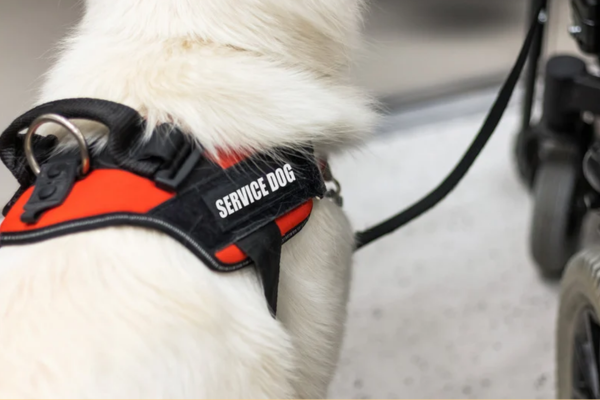Service dogs play a vital role in supporting individuals with disabilities. They ensure their handlers can navigate daily life with greater independence and confidence! In Colorado, federal and state laws provide protections for service dog handlers and clearly outline guidelines for businesses and the public.
What is a Service Dog?
Under the Americans with Disabilities Act (ADA), a service dog is defined as a dog that is individually trained to perform specific tasks or do work for a person with a disability. These tasks must be directly related to the individual’s disability in order for the dog to be classified as a service dog. Some examples of tasks include guiding blind individuals, alerting deaf individuals, pulling a wheelchair, or providing assistance during a seizure.
It’s important to acknowledge that emotional support, therapy, and companion animals do not qualify as service animals under the ADA. These dogs are not trained to perform specific tasks.
Where Are Service Animals Allowed?
Both federal and Colorado state laws ensure individuals with service dogs have access to:
Public Accommodations
Including restaurants, hotels, retail stores, theaters, and other businesses open to the public.
Government Facilities
State and local government buildings, including courthouses and public libraries.
Transportation
Public transportation services such as buses, trains, and subway systems.
Workplaces
Employers must make reasonable accommodations for employees with service animals, unless those accommodations would cause undue hardship.
Housing
Under the Fair Housing Act, individuals with disabilities are allowed to have their service animals in housing, regardless of any “no pets” policy that may be in place.
What Questions Can Establishments Ask Service Dog Handlers?
Business owners, landlords, employers, and other members of the public can legally ask only two specific questions of individuals with service dogs.
- Is the dog a service animal required because of a disability?
- What work or task has the dog been trained to perform?
Aside from these two questions, staff cannot request documentation, require the dog to demonstrate its task, or inquire about the nature of the person’s disability.
Service Animals in Training
While the ADA does not grant access rights to service animals in training, Colorado law does provide specific protections! Under Colorado Revised Statutes § 24-34-803, individuals training service animals are given the same access rights as those with disabilities who fully trained service animals accompany.
Misrepresentation of Service Animals
Colorado has enacted laws penalizing the intentional misrepresentation of pets as service animals to protect the integrity of service animal designations. Under Colorado Revised Statutes § 18-13-107.7, knowingly misrepresenting an animal as a service animal or a service animal in training is a petty offense.
Penalties include:
- First Offense: $25 fine
- Second Offense: $50 to $200 fine
- Third or Subsequent Offense: $100 to $500 fine
Individuals must have previously received a verbal or written warning regarding the misrepresentation to be charged.
Responsibilities of Service Dog Handlers
Service dog handlers are responsible for ensuring their service dogs are always controlled. This means the dog should be harnessed, leashed, or tethered in some way, unless these devices interfere with the service dog’s work. In cases where a leash or other device isn’t possible, the handler must maintain control through voice, signal, or other effective means.
Businesses are not allowed to charge additional fees or deposits for service animals. However, if a service animal causes damage, the handler can be held liable for repair and/or cleaning costs.
Colorado’s service dog laws are designed to uphold the rights of individuals with disabilities. They ensure that handlers can access public spaces, housing, and employment opportunities with their service animals. These laws also protect businesses and the public by setting clear guidelines and penalties for misrepresentation.
At Justice Speaks, we’re committed to advocating for the civil rights of individuals with disabilities and their service dogs!


